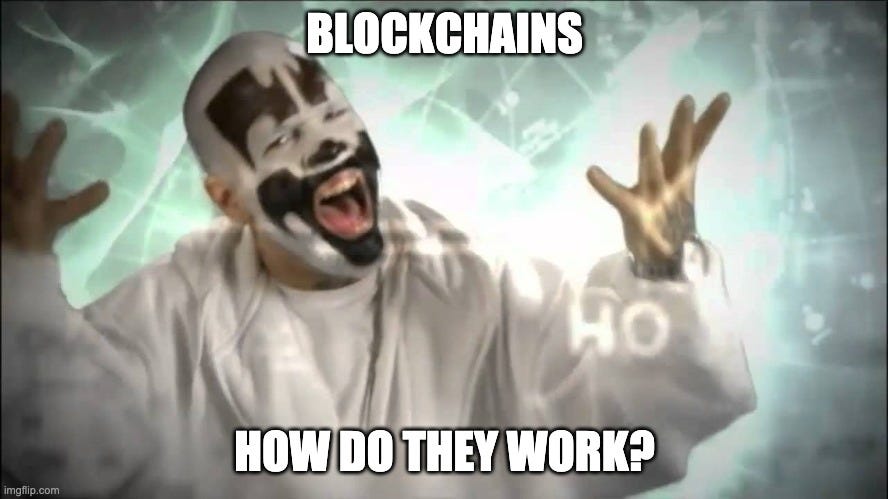The real reason Elon is trolling Bitcoin
Plus the poor man's ICP and how to stay maximalist in the heat
In this issue:
The real reason Elon is trolling Bitcoin
The Internet Computer is the poor man’s ICP (reader submitted)
Has Ethereum already won the developer war? (reader submitted)
The real reason Elon is trolling Bitcoin
Over the weekend celebrated market manipulator and part-time CEO Elon Musk continued his ongoing campaign to make me sad. Last week we pointed out the irony in Musk critiquing the environmental implications of Bitcoin while also promoting Dogecoin, which uses the same proof-of-work technology only less efficiently. Fortunately Elon moved quickly to address our criticisms:
Here are two interesting and true things about that tweet. The first is that the price of Dogecoin jumped more than ~20% in the half hour after Musk tweeted. The second is that there are no Dogecoin developers and haven’t been since 2018. So that’s fun.
I mean technically anyone can be a Dogecoin developer if they want, the code is open source. For the last few years no one thought developing Dogecoin’s code was worth their time, but Elon Musk has a lot of money1 and if he decides that he wants some Dogecoin developers he can probably afford them.
Here is the plan:
That is an old-school classic that Elon is invoking! Increasing blocksize to lower fees feels very intuitive. The problem is that larger blocks make it harder to download and verify the blockchain for yourself - which makes a currency less decentralized. That may sound abstract but decentralization is the only reason cryptocurrencies exist in the first place. If you can only access a blockchain by going through a trusted third party service than the blockchain itself is pointless.
There was once a large and vocal subset of the Bitcoin community who lobbied (unsuccessfully) to increase the Bitcoin blocksize just as Musk is recommending for Dogecoin. They eventually forked Bitcoin and released Bitcoin Cash (BCH). BCH blocks arrive at the same speed but they are ~32x bigger and the fees are (at time of writing) ~960x lower. On the other hand, Bitcoin Cash trades for ~40x less than Bitcoin, so I wouldn’t say it has won hands down yet.
This was a very contentious debate at the time (~2017/2018) and Bitcoiners are still pretty sensitive about it. Some of them were mean to Mr. Musk on Twitter.
If I were a Tesla shareholder I would be hoping for a more sophisticated portfolio strategy than "sell whenever the Twitters are mean to me" but I am not a Tesla shareholder so Tesla is free to disregard my concerns.
The really strange thing here is that the issues Musk is raising and the solutions he is offering are … weirdly unsophisticated? They are the ideas you would expect from your high school buddy who gets their investment tips from the Robinhood podcast, not a wealthy techno-industrialist who co-founded PayPal. It raises the question of whether Elon is genuinely this uninformed or if he is trolling instead.
In Q1 Tesla booked a record $438M in quarterly profits. Tesla is a car company but that doesn’t mean it makes its money selling cars. $101M of those profits came from selling Bitcoin. The rest came not from selling cars but from selling Renewable Energy Credits (RECs) to other automotive companies seeking to offset their own carbon emissions. Tesla made $518M selling RECs in Q1.2 Last week Tesla’s largest REC customer Fiat Chrysler announced they would meet their carbon emission standards this year. They will no longer need to buy RECs from Tesla.
So Tesla is pivoting to get approval from the Environmental Protection Agency (EPA) to sell renewable credits to other companies besides auto manufacturers. Perhaps Musk suddenly and publicly became alarmed about the environmental footprint of crypto as part of a broader negotiating strategy. Plus if some mean ol’ Bitcoiners force you to sell your Bitcoin the profit you book can help cover declining REC revenue. Win win!
Maybe they already have.
The Internet Computer is the poor man’s ICP
"What is the Internet Computer (ICP) all about?" - IS
The Internet Computer is the rebranding of an altcoin project originally called Dfinity. The Dfinity Foundation raised almost ~$200M in 2018 and then eventually got around to launching their network/token (now known as ICP) earlier this month. On launch it briefly surged to #4 largest cryptocurrency by market cap. As of writing it is currently the number #9 cryptocurrency, just ahead of Bitcoin Cash.
Dfinity describes the Internet Computer as a "Cloud 3.0" technology that will compete with AWS and other computing-as-a-service providers. They claim ICP has "infinite capacity" and "instant finality" which they achieve by stitching together independent component blockchains. According to Dfinity the ICP was actually designed to survive a nuclear strike. Hopefully that feature doesn’t come up.
A good rule of thumb is that if anyone is using words like "instant" and "infinite" to describe their blockchain they are being dishonest about the trade-offs. There are no free, instant or infinite blockchains just as there are no perpetual motion machines and there is no such thing as a free lunch.
You can safely ignore anyone who wants to sell you one.
Has Ethereum already won the developer war?
“My understanding is that it's technically feasible to build smart contracts on top of Bitcoin or on Ethereum. But my sense is that most of that activity is happening on ETH. I'm curious first if my perception is right, and if so, why has the crypto-developer community favored ETH so far? How does that fit into your belief in Bitcoin maximalism?” - AW
It is tough to precisely measure or compare things like developer activity, but most people I think would agree that there are more developers building things on top of Ethereum. According to this report there are ~2300 developers working on Ethereum and another ~920 or so working on DeFi (compared to ~360 Bitcoin developers).
Ethereum’s primary selling point from launch has been that it is 'Turing complete,' which means it is capable of running any arbitrary program. Bitcoin is not Turing complete - it is actually pretty stripped down by design. So there are lots of things that Ethereum can do that Bitcoin simply cannot do.
When people talk about running smart contracts on Bitcoin what they usually mean is a platform like RSK, which leverages Bitcoin’s blockchain for security but uses its own blockchain and token to achieve Turing completeness. So RSK can run Ethereum smart contracts using Bitcoin - but on the other hand it is also straightforward to wrap Bitcoin into an Ethereum asset to use in Ethereum smart contracts. The difference is more of an implementation detail than a change in what is possible. Basically Bitcoin itself cannot support smart contracts but it is relatively easy for any smart contract platform to support Bitcoin.
I remain a Bitcoin maximalist, i.e. I think the cryptocurrency market is winner-take-all and that the winner will eventually be Bitcoin. Smart contract functionality is already commoditizing: Ethereum invented the ERC-20 standard and the Ethereum Virtual Machine but those are now both industry-wide protocols that every smart contract platform supports. Binance Smart Chain for example (now the third largest cryptocurrency by market cap) is essentially just a fork of Ethereum that compromises on decentralization in order to offer lower fees.
The only thing that Bitcoin lets you do is own BTC, but on the other hand Bitcoin is the only platform that lets you do that. Ethereum lets you do lots of things besides just own ETH but lots of other platforms can do those things, too. So a cheaper Bitcoin isn’t a better Bitcoin because it isn’t Bitcoin. But a cheaper Ethereum really is a better Ethereum because ETH isn’t the point of Ethereum. It’s just a means to an end.
Stanley Druckenmiller describes the difference between Bitcoin’s competitive position and Ethereum’s competitive position rather well in this clip (just watch the clip, the pull quote they chose for the tweet is terrible):
Other things happening right now:
Here is a really interesting post from Bryne Hobart of Coindesk comparing crypto-native exchange FTX to the euro-dollar parallel banking system that sprang up in the aftermath of the Bretton Woods agreement.
Stablecoin company Tether Ltd released the first report on their reserve holdings since launch in 2014. As many suspected Tether’s holdings are only ~75% backed by cash and cash equivalents. The rest are made up in loans to unspecified third parties (~12.5%), bonds/precious metals (~10%) and digital tokens (~1.6%). Being only 3/4 backed is obviously bad but it is better than many suspected - it definitely rules out the conspiracy theory that Tether was printing unbacked Tether tokens to pump the crypto market and hide their insolvency.
Yes, that is the Tom from MySpace.
Presented without comment:
And a lot of USD, too.
Tesla's Q1 revenue for reference was ~$10.4B.











